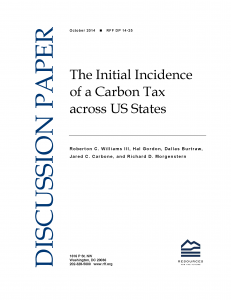Crediting Early Action under EPA’s Clean Power Plan
This is the seventh in a series of questions that highlights RFF’s Expert Forum on EPA’s Clean Power Plan. Readers are invited to submit their own comments to the questions and/or the responses using the “Leave a Comment” box below. See all of the questions to date here. RFF asks the experts: Should EPA credit early action […]
The GAO Report: Competition of Oil Export Ban Studies
Today, the U.S. Government Accountability Office (GAO) released a report that reviews four studies about lifting the ban on U.S. crude oil exports—those by RFF, ICF International and EnSys Energy, IHS Global Insights, and NERA. According to the GAO’s summary, these studies estimate that U.S. crude oil prices would increase by about $2 to $8 […]
Cap and Trade in China: How Might It Work?
China plans to start a nationwide cap-and-trade market in 2016. But can China, whose economy still contains many nonmarket features, properly design and implement a fundamentally market-based policy? In our new RFF discussion paper, my coauthors (RFF’s Richard Morgenstern, Zhongmin Wang, and Xu Liu) and I attempt to answer this question by examining cap-and-trade pilot […]
Looking at the Effects of a Carbon Tax across States

The use of revenue from a carbon tax or cap-and-trade program substantially affects who gains and who loses as a result of the policy; indeed, it is often more important than the effect of the carbon tax itself. In a previous RFF discussion paper, we (together with RFF’s Dallas Burtraw and Richard Morgenstern, and Jared […]
More Natural Gas, Less Warming?
The unexpected energy revolution caused by the rapid growth in North American shale gas production has produced benefits related to the economy, jobs, energy security, and local air pollution, and has contributed to a decrease in US greenhouse gas emissions. However, as my colleagues and I report in a new study published online today by Nature Advance […]
Designing Cost-Efficient Surveillance to Control Invasive Species
Invasive species can cause substantial reductions in a region’s ecological, industrial, and human welfare, and often require significant control expenditures. The Emerald Ash Borer, for example, established itself in the United States in the early 1990s and has caused the death of hundreds of millions of ash trees and is estimated to cause billions of […]
Improving the Efficiency of Coal Plants under EPA’S Clean Power Plan
This is the sixth in a series of questions that highlights RFF’s Expert Forum on EPA’s Clean Power Plan. Readers are invited to submit their own comments to the questions and/or the responses using the “Leave a Comment” box below. See all of the questions to date here. RFF asks the experts: how can coal power plants […]
The Role of Renewable Energy in EPA’s Clean Power Plan
This is the fifth in a series of questions that highlights RFF’s Expert Forum on EPA’s Clean Power Plan. Readers are invited to submit their own comments to the questions and/or the responses using the “Leave a Comment” box below. See all of the questions to date here. RFF asks the experts: Does EPA make appropriate assumptions […]
Is There Really Bipartisan Consensus on Benefit-Cost Analysis of Regulation?
Beyond obvious rhetoric, are there discernible differences among the ways that Democrats and Republicans tackle economic analyses of federal regulations? Yes—and no, according to our content analysis of all the Office of Management and Budget’s (OMB) annual Reports to Congress on the Benefits and Costs of Federal Regulations (or, for our purposes here, Reports) issued […]
Climate Change Policy Imperatives: Let’s Not Neglect Adaptation
Each succeeding year in which the world fails to agree to forceful and binding commitments to slash releases of greenhouse gas emissions underscores the increased urgency of complementary measures to strengthen resilience to impacts of global warming that may no longer be avoided or sufficiently mitigated through just emissions reduction. Framing that dilemma in shorthand […]

 Subscribe; to our RSS Feed
Subscribe; to our RSS Feed Tweets by @RFF_org
Tweets by @RFF_org 
Recent Comments